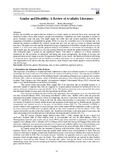Please use this identifier to cite or link to this item:
https://cris.library.msu.ac.zw//handle/11408/3524Full metadata record
| DC Field | Value | Language |
|---|---|---|
| dc.contributor.author | Maruzani, Nyevero | - |
| dc.contributor.author | Mapuranga, Barbra | - |
| dc.date.accessioned | 2019-04-12T09:18:24Z | - |
| dc.date.available | 2019-04-12T09:18:24Z | - |
| dc.date.issued | 2016 | - |
| dc.identifier.issn | 2224-5766 | - |
| dc.identifier.uri | https://www.iiste.org/Journals/index.php/RHSS/article/view/29434/30224 | - |
| dc.identifier.uri | http://hdl.handle.net/11408/3524 | - |
| dc.description.abstract | Gender and disability are aspects that are situated in a cultural matrix not divorced from socio- economic and historical contexts. From these contexts, people with disabilities’ capabilities are either expanded or limited as power dynamics come into play. This paper argues that while men and women experience disability, the experience of disability is heightened by gender. While it is easy for a disabled man to be tolerated and to be married the situation is different for disabled women and girls who are seen as a drain on already stretched resources. The paper notes that specific research focusing on experiences of disability in higher education is very limited. It is even worse when specific gendered analysis of disabilities is of concern. In an attempt to fit into that research gap, this paper focus on how the existing literature has treated the gender dimension of disability. The conceptual paper is guided by the capabilities theory. This theory or approach is a broad normative framework for the evaluation of individual well-being and social arrangements, the design of policies and proposals about social change in society. Its argument is based on two claims: the freedom to achieve well-being is of primary moral importance; and that freedom to achieve well-being is to be understood in terms of people's real opportunities to do and be what they have reason to value. Policies must enable people to convert resources into functionings. | en_US |
| dc.language.iso | en | en_US |
| dc.publisher | International Institute for Science, Technology and Education | en_US |
| dc.relation.ispartofseries | Research on Humanities and Social Sciences;Vol. 6, No. 6: p. 74-86 | - |
| dc.subject | Disabilities | en_US |
| dc.subject | Gender | en_US |
| dc.subject | Men | en_US |
| dc.subject | Women | en_US |
| dc.title | Gender and disability: a review of available literature | en_US |
| dc.type | Article | en_US |
| item.openairetype | Article | - |
| item.languageiso639-1 | en | - |
| item.openairecristype | http://purl.org/coar/resource_type/c_18cf | - |
| item.fulltext | With Fulltext | - |
| item.grantfulltext | open | - |
| item.cerifentitytype | Publications | - |
| Appears in Collections: | Research Papers | |
Files in This Item:
| File | Description | Size | Format | |
|---|---|---|---|---|
| Gender and Disability.pdf | Full Text | 222.16 kB | Adobe PDF |  View/Open |
Page view(s)
136
checked on Apr 18, 2025
Download(s)
66
checked on Apr 18, 2025
Google ScholarTM
Check
Items in MSUIR are protected by copyright, with all rights reserved, unless otherwise indicated.



